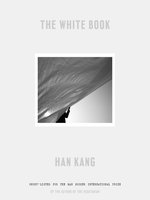by Han Kang
“Stunningly beautiful writing . . . delicate and gorgeous . . . one of the smartest reflections on what it means to remember those we’ve lost.”—NPR
While on a writer’s residency, a nameless narrator focuses on the color white to creatively channel her inner pain. Through lyrical, interconnected stories, she grapples with the tragedy that has haunted her family, attempting to make sense of her older sister’s death using the color white. From trying to imagine her mother’s first time producing breast milk to watching the snow fall and meditating on the impermanence of life, she weaves a poignant, heartfelt story of the omnipresence of grief and the ways we perceive the world around us.
In captivating, starkly beautiful language, The White Book offers a multilayered exploration of color and its absence, of the tenacity and fragility of the human spirit, and of our attempts to graft new life from the ashes of destruction.
“Stunningly beautiful writing . . . delicate and gorgeous . . . one of the smartest reflections on what it means to remember those we’ve lost.”—NPR
While on a writer’s residency, a nameless narrator focuses on the color white to creatively channel her inner pain. Through lyrical, interconnected stories, she grapples with the tragedy that has haunted her family, attempting to make sense of her older sister’s death using the color white. From trying to imagine her mother’s first time producing breast milk to watching the snow fall and meditating on the impermanence of life, she weaves a poignant, heartfelt story of the omnipresence of grief and the ways we perceive the world around us.
In captivating, starkly beautiful language, The White Book offers a multilayered exploration of color and its absence, of the tenacity and fragility of the human spirit, and of our attempts to graft new life from the ashes of destruction.






